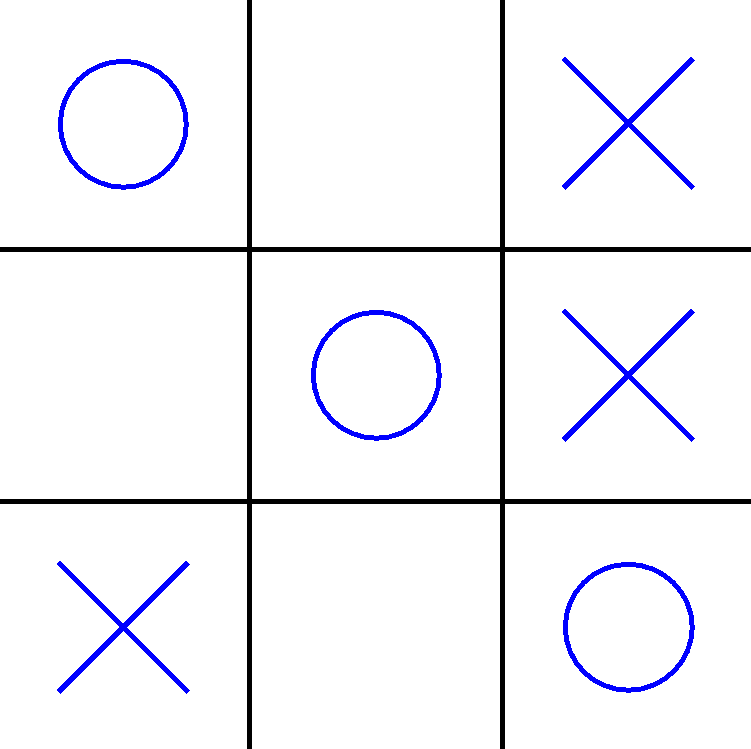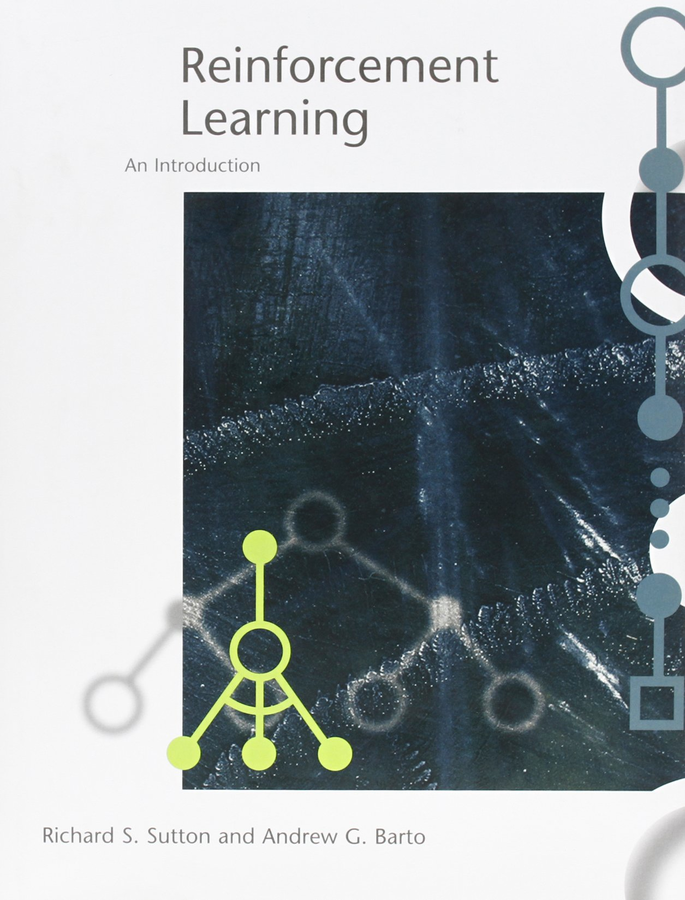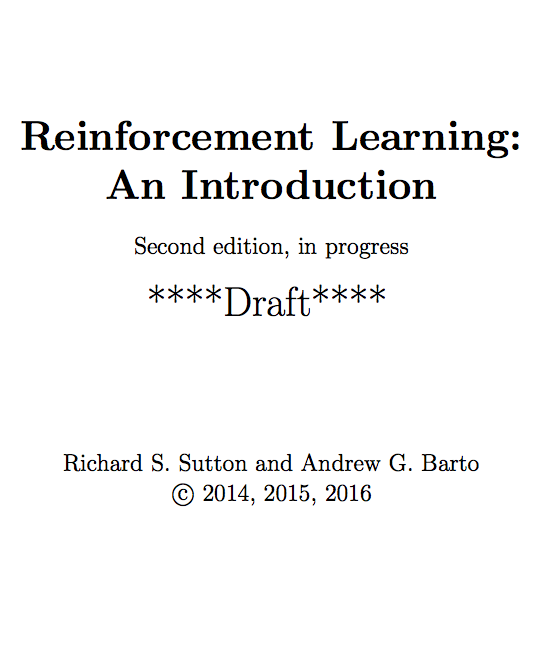



Machine Learning
Workshop: Part Four



Reinforcement Learning

(Let's dive in now)
@KatharineCodes @JavaFXpert
Using BURLAP for Reinforcement Learning


@KatharineCodes @JavaFXpert
Learning to Navigate a Grid World with Q-Learning


@KatharineCodes @JavaFXpert
Rules of this Grid World


- Agent may move left, right, up, or down (actions)
- Reward is 0 for each move
- Reward is 5 for reaching top right corner (terminal state)
- Agent can't move into a wall or off-grid
- Agent doesn't have a model of the grid world. It must discover as it interacts.
Challenge: Given that there is only one state that gives a reward, how can the agent work out what actions will get it to the reward?
(AKA the credit assignment problem)
Goal of an episode is to maximize total reward
@KatharineCodes @JavaFXpert
Visualizing training episodes


From BasicBehavior example in https://github.com/jmacglashan/burlap_examples
@KatharineCodes @JavaFXpert
This Grid World's MDP (Markov Decision Process)


In this example, all actions are deterministic
@KatharineCodes @JavaFXpert
Agent learns optimal policy from interactions with the environment (s, a, r, s')


@KatharineCodes @JavaFXpert
Expected future discounted rewards, and polices


@KatharineCodes @JavaFXpert
This example used discount factor 0.9


Low discount factors cause agent to prefer immediate rewards
@KatharineCodes @JavaFXpert


How often should the agent try new paths vs. greedily taking known paths?
@KatharineCodes @JavaFXpert
Q-Learning approach to reinforcement learning

| Left | Right | Up | Down | |
|---|---|---|---|---|
| ... | ||||
| 2, 7 | 2.65 | 4.05 | 0.00 | 3.20 |
| 2, 8 | 3.65 | 4.50 | 4.50 | 3.65 |
| 2, 9 | 4.05 | 5.00 | 5.00 | 4.05 |
| 2, 10 | 4.50 | 4.50 | 5.00 | 3.65 |
| ... |
Q-Learning table of expected values (cumulative discounted rewards) as a result of taking an action from a state and following an optimal policy. Here's an explanation of how calculations in a Q-Learning table are performed.
Actions
States
@KatharineCodes @JavaFXpert


















Tic-Tac-Toe with Reinforcement Learning

Learning to win from experience rather than by being trained

@KatharineCodes @JavaFXpert
Inspired by the Tic-Tac-Toe Example section...

@KatharineCodes @JavaFXpert
Tic-Tac-Toe Learning Agent and Environment


X
O
Our learning agent is the "X" player, receiving +5 for winning, -5 for losing, and -1 for each turn
The "O" player is part of the Environment. State and reward updates that it gives the Agent consider the "O" play.
@KatharineCodes @JavaFXpert
Tic-Tac-Toe state is the game board and status

| States | 0 | 1 | 2 | 3 | 4 | 5 | 6 | 7 | 8 |
|---|---|---|---|---|---|---|---|---|---|
| O I X I O X X I O, O won | N/A | N/A | N/A | N/A | N/A | N/A | N/A | N/A | N/A |
| I I I I I I O I X, in prog | 1.24 | 1.54 | 2.13 | 3.14 | 2.23 | 3.32 | N/A | 1.45 | N/A |
| I I O I I X O I X, in prog | 2.34 | 1.23 | N/A | 0.12 | 2.45 | N/A | N/A | 2.64 | N/A |
| I I O O X X O I X, in prog | +4.0 | -6.0 | N/A | N/A | N/A | N/A | N/A | -6.0 | N/A |
| X I O I I X O I X, X won | N/A | N/A | N/A | N/A | N/A | N/A | N/A | N/A | N/A |
| ... |
Q-Learning table of expected values (cumulative discounted rewards) as a result of taking an action from a state and following an optimal policy
Actions (Possible cells to play)
Unoccupied cell represented with an I in the States column

@KatharineCodes @JavaFXpert
Tic-Tac-Toe with Reinforcement Learning


@KatharineCodes @JavaFXpert
Summary of neural network links (1/2)

Andrew Ng video:
https://www.coursera.org/learn/machine-learning/lecture/zcAuT/welcome-to-machine-learning
Iris flower dataset:
https://en.wikipedia.org/wiki/Iris_flower_data_set
Visual neural net server:
http://github.com/JavaFXpert/visual-neural-net-server
Visual neural net client:
http://github.com/JavaFXpert/ng2-spring-websocket-client
Deep Learning for Java: http://deeplearning4j.org
Spring initializr: http://start.spring.io
Kaggle datasets: http://kaggle.com
@KatharineCodes @JavaFXpert
Summary of neural network links (2/2)

Tic-tac-toe client: https://github.com/JavaFXpert/tic-tac-toe-client
Gluon Mobile: http://gluonhq.com/products/mobile/
Tic-tac-toe REST service: https://github.com/JavaFXpert/tictactoe-player
Java app that generates tic-tac-toe training dataset:
https://github.com/JavaFXpert/tic-tac-toe-minimax
Understanding The Minimax Algorithm article:
http://neverstopbuilding.com/minimax
Optimizing neural networks article:
https://medium.com/autonomous-agents/is-optimizing-your-ann-a-dark-art-79dda77d103
A.I Duet application: http://aiexperiments.withgoogle.com/ai-duet/view/
@KatharineCodes @JavaFXpert
Summary of reinforcement learning links

BURLAP library: http://burlap.cs.brown.edu
BURLAP examples including BasicBehavior:
https://github.com/jmacglashan/burlap_examples
Markov Decision Process:
https://en.wikipedia.org/wiki/Markov_decision_process
Q-Learning table calculations: http://artint.info/html/ArtInt_265.html
Exploitation vs. exploration:
https://en.wikipedia.org/wiki/Multi-armed_bandit
Reinforcement Learning: An Introduction:
https://webdocs.cs.ualberta.ca/~sutton/book/bookdraft2016sep.pdf
Tic-tac-toe reinforcement learning app:
https://github.com/JavaFXpert/tic-tac-toe-rl
@KatharineCodes @JavaFXpert




Machine Learning


Workshop: Part Four
Machine Learning Exposed Workshop: Part Four
By javafxpert
Machine Learning Exposed Workshop: Part Four
Part four of Machine Learning Exposed workshop. Shedding light on machine learning, being gentle with the math.
- 2,885





